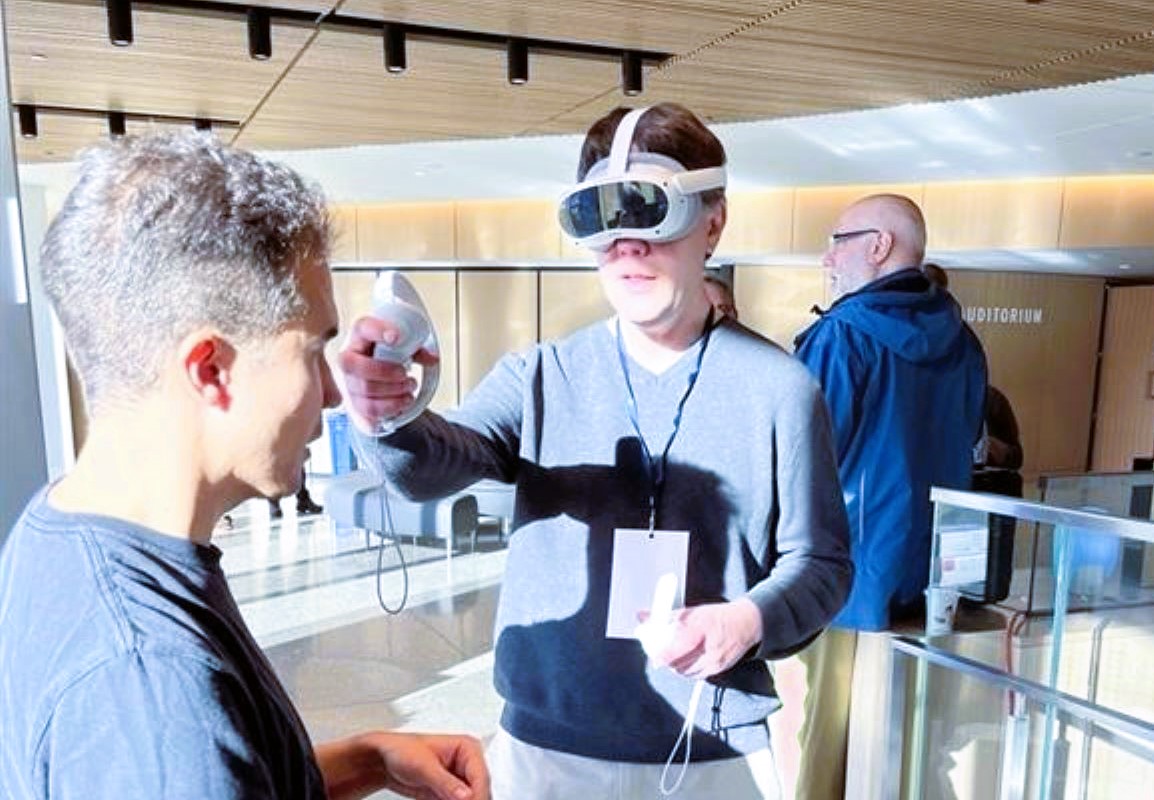
A staff member from the Centre for the Advancement of Teaching and Learning tries out a VR training module at the Hyper Interactive Arts + Tech Conference.
Building teaching skills – digitally
How virtual reality can help faculty handle challenging classroom situations confidently
A new program being piloted through the Centre for the Advancement of Teaching and Learning aims to support faculty in developing skills for various aspects of teaching, including interpersonal communication, conflict management and negotiation that can be a challenge to practice.
And a popular video game technology may provide the key to a realistic experience.
“There is some literature describing how virtual reality (VR) is being used in the training of K-12 teachers, and that got me thinking about how we could support faculty in developing skills for teaching that are often difficult to practice until you get into the situation in your class,” says Brenda M. Stoesz, research lead for the science of teaching and learning.
Stoesz is spearheading the development of an educator training program that uses VR to prepare instructors for challenging situations in different teaching and learning scenarios.
“We want to give instructors an opportunity to practice what to do in a virtual reality space that doesn’t have any consequences, but still feels quite real and allows them to feel the stress response,” says Stoesz, “but then also practice doing it enough times that the stress response might be decreased so they can handle these situations in a better way.”
The Centre for the Advancement of Teaching and Learning currently facilitates workshops on what to do in various teaching and learning situations, but Stoesz is aiming to give faculty members an opportunity to practice these soft (or people) skills in a more realistic way.
But how realistic is it?
“Even if one thinks that VR is just for gaming and that the environment might feel a bit cartoony at times, it’s quite surprising… once you put on that headset you start to feel like you’re in a different place. Even though it’s not real, you do get the sensation of being immersed in an environment, and you slowly start to really interact with the environment like it is real.”
Realtime Feedback
While Stoesz says they already offer some practice-based workshops, the benefit of VR is that it allows one to practice using soft skills in these scenarios that unfold in real time and then to receive judgement-free feedback immediately after the scenario has played out. Scenarios can also be repeated until a skill has been mastered.
“The biggest benefit is that feeling of being immersed to actually practice and then to get that real time feedback so that one can change their approach in order to get better at handling a situation when it arises.”
Stoesz notes that the VR program leverages generative artificial intelligence to enhance the experience.
While role-playing is another excellent way to practice soft skills, in a workshop setting, some people may feel self-conscious or anxious, says Stoesz, which can limit the effectiveness of soft skills training.
“With the VR program we hope that some of that self-consciousness can be reduced, and that people can truly practice the way that they would practice in the real-world setting, without feeling the judgement from a human around them,” she says.
Collaborative approach
The first module the team is working on is about effective communication skills, specifically how to communicate with students in ways that are beneficial to both parties. Future modules will include negotiation and conflict management, and microaggressions in the teaching and learning context.
Stoesz says she was inspired by the work done in the College of Nursing around VR and wanted to see how it could be incorporated into the training opportunities that are offered for faculty.
The approach to developing these training modules has been, and will continue to be, collaborative.
A wide variety of stakeholders from across the university have provided their perspectives on the training module, including representatives from Student Advocacy, Student Engagement and Success, the Faculty of Education, the Office of Human Rights and Conflict Management and the Department of Computer Science. Stoesz adds that having different perspectives from across the university strengthens the project.
Feedback from participants will also inform the development of additional VR modules for UM faculty.
At its core this is a professional development program for educators, but Stoesz’s team will also be gathering evidence to see that the program is engaging, increases confidence in teaching, and improves learning experiences for students.
“A research program exploring the impact of postsecondary educator VR training — and sharing the findings with faculty who are in a dual role of researcher and educator — is important, so that they can see that we are making sure we are providing an evidence-based professional development program,” says Stoesz.
Information about the pilot VR Professional Development Program will be shared with the University of Manitoba community in February 2024 through The Centre for the Advancement of Teaching and Learning.
The university is currently making ongoing efforts in support of its digital strategy and this article highlights how digital technology is improving our practices. Faculty and staff who are interested in engaging in discussions about digital best practices, technology and trends are invited to join the Digital Community of Practice.






